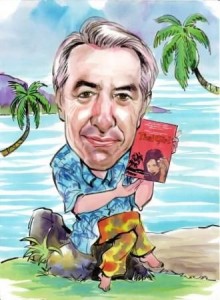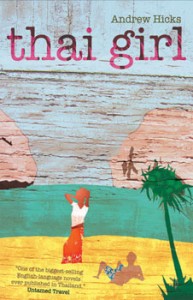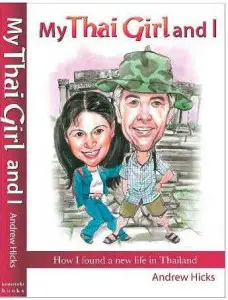 Andrew Hicks is a retired British corporate lawyer and university professor who was born near Stratford-on-Avon in the English Midlands during the big freeze of 1947. Andrew became famous on the Thai literary scene after the publication in 2004, of his debut novel Thai Girl, a bitter sweet romance that explores the mutual fascination between visiting farang and Thais.
Andrew Hicks is a retired British corporate lawyer and university professor who was born near Stratford-on-Avon in the English Midlands during the big freeze of 1947. Andrew became famous on the Thai literary scene after the publication in 2004, of his debut novel Thai Girl, a bitter sweet romance that explores the mutual fascination between visiting farang and Thais.
Following this success, in 2008 he published My Thai Girl and I, a non-fiction book about meeting his Thai wife, Cat and about their life together in Thailand. He currently lives with Cat in her village in Surin, a dry, rice growing province in the northeast of Thailand. In this interview, Andrew talks about his books, the writing process, relationships, and his life in the countryside.
Voicu Mihnea Simandan: You’ve authored several non-fiction books most of which are law related and then had your debut in fiction with Thai Girl, a book that has done extremely well in bookstores across Southeast Asia. How did the researcher become a novelist?
Andrew Hicks: I’d always wanted to write something with a better story line than company law and my early retirement from university life and backpacking again in Thailand gave me the time and the opportunity.
V.M.S.: Was there any book research for Thai Girl or was it written purely from your own experiences?
A.H: Every fiction writer draws on their own emotional and other experiences, even when the story is in no way auto-biographical. I found myself writing in my late fifties so thus had plenty to draw on. In retirement while revisiting old haunts in SE Asia I was always alone, my sole companion a notebook in which I collected impressions of the experiences I was having and of the characters I’d met. On realising I’d collected a mountain of material about Thailand, I just had to find a distinctive plot that wasn’t just a rehash of so many others and to stitch it all together as a novel. What I came up with could be described as a Romeo and Juliet story without the coffins, about Ben and the beguiling ‘Thai girl’ who persistently said no.
The one bit of active research I had to do was when a Bangkok friend took me on a crawl of the bars in the Sukhumvit area. This is described pretty much blow for blow and beer by beer in the middle of the book when Ben befriends Jack Russell, the thinking man’s sex tourist. Even the session with the lady boy fortune teller (at page 158 of the current reprint) is an edited transcript of the tape recording I took of his magical hundred baht mumblings. This sort of thing just can’t be faked.
 V.M.S.: How long did it take you to write Thai Girl? Tell us about your writing routine.
V.M.S.: How long did it take you to write Thai Girl? Tell us about your writing routine.
A.H: I wrote for fun with no clear expectation of getting published, so I wrote over about three years whenever time and inclination allowed. There was therefore little in the way of a routine. This was writing for pleasure so I wrote large chunks at a time because I just couldn’t stop. As I knew my characters so well, having met them so many times on my travels, they spoke to me fluently and I just had to write it all down. A bit more painful was revising the manuscript which I did many times. Thanks to word processing I could revise the whole book, print it all out and after some weeks or months pick it up again and go through it once more. Cat was with me by this time and she thought me quite mad.
V.M.S.: In Thai Girl, Ben’s relationship to Fon, a poor masseur working on the Island of Koh Samet, is never consummated. Why is that? As a reader, I felt that the novel is not close to actual reality: it’s very difficult to picture a young farang indulging in Platonic love with an attractive Thai woman!
A.H: I don’t think it’s Platonic love… many men visiting Thailand do often go crazy about one girl even when there are many more opportunities to be had. In fact Ben really has the hots for Fon and he knows exactly what he wants. Being a Brit he is conditioned though by our long medieval tradition of courtship, now updated as the ‘love affair’ of the movies, and he courts Fon, the ‘Thai girl’ with single-minded obsession. Fon is totally bemused by all this as her cultural assumptions are so very different. He insists that he loves her when all he wants is sex, yet he offers her nothing of substance to win her heart. She wants a reliable man who can support her and not an immature hot-head who talks too much. What’s more, in her small community of beach masseurs, she is afraid of being talked about if she succumbs to the advances of passing travelers and of losing her very lucrative job. That’s probably why she keeps Ben at arms length though even I can never be sure!
If the story is thus about a couple being divided by their incompatible cultures, this is perhaps why things don’t happen faster between them. But was their friendship not consummated? On at least two occasions towards the end of the book they have the opportunity and the story line politely fades off into soft focus! Ultimately of course Fon risks her heart but then is abandoned by Ben who flies back home to England and to his new career as a lawyer.
 V.M.S.: While reading my My Thai Girl and I it didn’t take me long to realize that your relationship to Cat, a woman half your age, is quite strong. What are the main factors that make the marriage between a farang and a Thai work?
V.M.S.: While reading my My Thai Girl and I it didn’t take me long to realize that your relationship to Cat, a woman half your age, is quite strong. What are the main factors that make the marriage between a farang and a Thai work?
A.H: The same factors as with any relationship perhaps. One big plus was that being together gave each of us a totally new life and new opportunities that would never otherwise have come to us. As we thus needed each other, it was really worth working at. Paradoxically, another plus factor is that we are so very different from each other. Where I come from, it is generally assumed that a couple should have a lot in common but I’ve found our cultural incompatibilities and differences to be a positive aspect of our relationship. It’s a bit boring if your partner is exactly the same as you and it’s been so stimulating learning about Cat and her culture… and whether what makes her tick is likely to cause an explosion.
There is one common incompatibility between many a farang and his Thai lady though. Every farang wants her to love him for himself and not for his money, while a Thai woman tends to judge his love by his willingness to empty his wallet.
V.M.S.: I’m sure that after the success of Thai Girl, it was easy to find a publisher for My Thai Girl and I. What can you tell us about the publishing industry in Thailand, in particular, and Southeast Asia, in general?
A.H: Let’s not be coy about this, I self-published both books, though Monsoon Books in Singapore then republished Thai Girl for distribution beyond Thailand. In general it’s largely impossible for a novice writer to get a book formally published by a commercial publisher anywhere in the world. This seems to be a ridiculous statement as bookshops are full of titles, but I’ve seen a statistic that one in a thousand manuscripts submitted for publication actually sees the light of day. In Thailand there are very few English language publishers who will fund the cost of producing and publishing a book. It is relatively cheap however, to do it yourself and to have a book designed and printed here, but it is then still necessary to get it distributed and sold. For me Asia Books has been the answer. Since their first orders of my books sold well, they continue to take books from me and these are distributed to all bookshops, airports and hotels throughout Thailand. It’s hard work being your own publisher though. Now of course, the world is changing with internet sales and print on demand books.
V.M.S.: You’ve traveled widely, from Europe to Africa to Asia and back again. Compared to all the countries you have visited, where does Thailand stand?
A.H: Each country has its own pros and cons. Indonesia and Malaysia for example are far more beautiful and have greater cultural variety than Thailand whose towns are drab entanglements of concrete, traffic and wires, while for much of the year the Thai countryside is bleached and dry. On the other hand, it is clichéic but true that the very special qualities of the Thai people themselves is what makes life so pleasant here. You could say that there are more pros than cons but this could be taken the wrong way.
V.M.S.: Unlike most expats in Thailand, you chose to live in Surin, a province in the northeast. What are the advantages and the disadvantages of living in the Thai countryside as opposed to the capital Bangkok?
A.H: Our Isaan village is a real community of families who have all been here for several generations. There are about 140 households and everyone is your aunty or a cousin and people really do pull together when the going is tough, which means most of the time. It is exactly how a rural community should be, though it is very much under threat as the countryside no longer provides a living and has been neglected by most governments. That’s what the recent disturbances in Bangkok have been about. Most expats live in the urban centres but you’d be surprised how many fetch up building a house in their wives’ village.
V.M.S.: What are you working on right now? What’s the next book that’s going to bear your name on its front cover?
A.H: It’s something completely different, a biography of the writer, Jack Reynolds. Born in 1913, he joined the Friends Ambulance Unit in China in 1945 and had some amazing experiences there, joining Unicef in Bangkok in 1951. In 1956 his world wide bestseller was published in London and New York called, “A Woman of Bangkok”. He then raised seven children and lived in Sukhumvit Soi 8 for the rest of his life, dying in 1984. Tracing his friends and associates and his various journalistic writings has been like detective work and great fun for me.
My other writing is on my blog about Thailand which is now several books long. In among lots of stories about me and Cat, there are several posts about Jack on.
V.M.S.: Thank you for your time.
A.H: As one writer to another, it’s always fun to stop and think about the why’s and wherefores of why we do it. Thank you so much.
Voicu Mihnea Simandan
Bangkok, Thailand
April 25, 2010


Dear Sir/Madam;
As searching on http://www.google.com, I would like to do printing on demand as I am have got my story from working in Luang Prabang, Lao P.D.R.
Plus, I am planning to study in Ireland.
I am deriving those financing problems about Air ticket, Travel Insurance, and Accommodation.
That’s why I am thinking about transform my experience (asset) into finance solution.
Please kindly advise if printing such kind of pocket book.
Many thanks with warm regards from the hectic Bangkok of an impending flooding soon,
Winai
@Winai: Try http://www.createspace.com or bangkokbooks.com!
Like Andrew, it took me three years to complete my book. I am just now trying to look for a publisher, but as I’m on a single Australian pension, and living with my Thai wife in Lampang, it is not an easy task.
I’m in the process of looking at an eBook, and if it’s somewhat successful, I will then search for a publisher.
Do any Thai publishers accept manuscripts? The content of my work is aboutn670% Australian, 25% Thai, and the remainder universal.
Any assistance would be of value.
Thank you for such an interesting interview.
Kind Regards,
Michael Conlan
Michael, have a look at http://www.bangkokbooks.com. They’re one of the few who still publish expat written books in Thailand…
Thanks Voicu, will check it out.
I am a published author of two fictions and now i have grown an interest to publish a book by any Thai publisher. can you give me any Thai publisher’s address who can help me to publish my English fiction in Thailand?
with warm regards
Prashenjit shome
@Prashenjit Try BooksMango.com – they seem to be the most active and accessible ones.